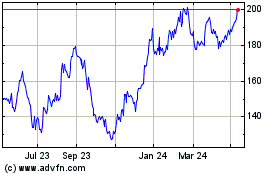By Peter Grant
Co-working is coming of age.
Some of the world's largest landlords, facing weak growth in
traditional office rents and occupancies, are investing heavily in
what until recently was viewed as a niche office business that
catered primarily to technology startups and millennials.
A venture of Brookfield Asset Management and Onex Corp. is
negotiating to buy IWG PLC, which has a market capitalization of
GBP2.48 billion ($3.46 billion) and operates co-working facilities
as well as more traditional offices for small and midsize
businesses. On Saturday, the U.K.'s Takeover Panel extended the
deadline for the venture to make an offer until Feb. 2. Brookfield
declined to comment on the negotiations.
Meanwhile, Blackstone Group LP last year purchased the Office
Group in a deal that valued the U.K.-based co-working provider at
GBP500 million. Blackstone, Brookfield and Houston-based Hines also
are exploring a wide range of deals with new shared-space firms
like WeWork Cos., IWG, Industrious and Convene.
The new workplace trend "is certainly something we're spending a
lot of time focusing on in our office space business," said Rob
Harper, head of U.S. asset management at Blackstone's real estate
group.
Co-working at its core is a new name for a business that has
been around for decades. Firms simply lease big blocks of space
from landlords and subdivide it for smaller tenants and provide a
range of office services.
But as the economy began to recover after the 2008 recession, a
new set of co-working companies led by WeWork found surging demand
among young workers for densely packed spaces with hip designs and
buzzy vibe.
The changes are permeating most dimensions of the traditional
office space business, including lease terms and structure,
building financing and even valuations.
Traditional office building investors are watching closely. So
is the tech world, given WeWork's stratospheric $20 billion
valuation.
The interest among major landlords is being fueled by the
recognition that the co-working business has been one of the few
bright spots in the office market during the economic recovery.
Overall, growth in the U.S. market has been much slower than in
previous upcycles. Current occupancy in the top 50 markets is
roughly 85%, according to research firm Green Street Advisors. It
was close to 92% in 2000 and greater than 87% in 2007, Green Street
said.
Co-working firms are one of the few sources of growing demand, a
point stressed at an October investor presentation by Boston
Properties Inc., one of the country's largest office real-estate
investment trusts. The firms accounted for 30 million square feet
of absorption during the current cycle, or 9.1% of the total, said
Owen Thomas, Boston Properties' chief executive.
The firm has cut numerous leasing deals with WeWork. In one
high-profile project, Boston Properties, WeWork and Rudin
Development, currently are developing a 14-story building in the
Brooklyn Navy Yard that will include a food hall, health center,
open lawn conference center and access to a new ferry terminal.
"It's clearly an important trend in our business," said Mr.
Thomas.
But it also poses headaches for building owners. Up until
recently, firms like WeWork have attracted thousands of
entrepreneurs and small firms to spaces in major office buildings
that in the past didn't serve such tenants.
The co-working approach to office space, especially its focus on
flexible and short-term commitments, is beginning to spill over
into the more traditional office space businesses, however. Big
companies are pressing landlords for space with a hipper vibe, more
amenities and that can be expanded and contracted easily.
This will likely increase landlord costs for building out
spaces. "If you want to attract and retain tenants, you've got to
be a little bit more bling," said Jed Reagan, a Green Street
analyst.
Also, because co-working generally uses less space per worker,
occupancy likely will decline as big tenants begin to transition to
more flexible spaces. If big tenants succeed in reducing lease
lengths from the standard 10 or 15 year contracts to a few years,
building owners are going to have a tougher time obtaining
financing.
"If you're a landlord you have to feel somewhat threatened,"
said Matt Kopsky, a REIT analyst at financial-services firm Edward
Jones.
Landlords are responding with a variety of strategies. Some of
the biggest players are buying co-working and flexible-space
businesses, like Blackstone did with the Office Group and
Brookfield might do with IWG.
Owners also are exploring a wide range of business deals with
firms like WeWork and Industrious. In some cases, landlords will
simply lease space to co-working businesses. In other cases,
landlords are cutting management agreements with co-working
companies similar to the kind of deals that hotel owners may cut
with hotel brands like Hilton or Marriott.
Brookfield Property Partners, a listed company controlled by
Brookfield Asset Management, also has acquired a roughly 18% stake
in Convene, which offers co-working spaces as well as on-demand
meetings and conferences.
"We're keeping our options alive and open at this point and
we've got many," said Ric Clark, chairman of Brookfield Property
Partners.
--Eliot Brown contributed to the article.
Write to Peter Grant at peter.grant@wsj.com
(END) Dow Jones Newswires
January 23, 2018 08:14 ET (13:14 GMT)
Copyright (c) 2018 Dow Jones & Company, Inc.
Iwg (LSE:IWG)
Historical Stock Chart
From Mar 2024 to Apr 2024

Iwg (LSE:IWG)
Historical Stock Chart
From Apr 2023 to Apr 2024
